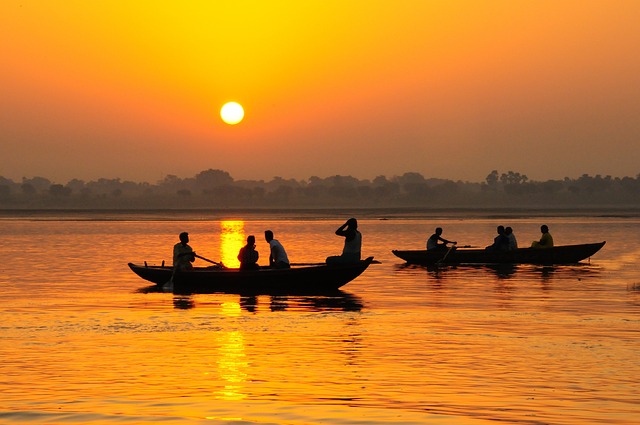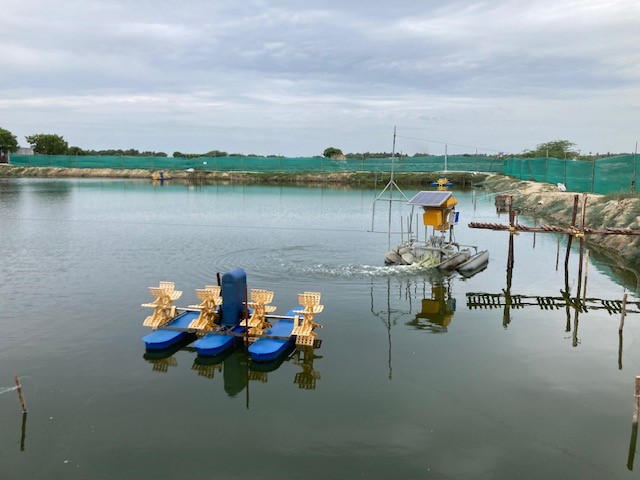India is one of the largest fish producing countries in the world, accounting for around 8% of global production.

Its fisheries are a vital source of nutrition, income and livelihood for millions of people on the domestic market, and also an important contributor to marine product and marine ingredient exports. In 2023, India ranked third in global fishmeal production.
Growing global pressure from retailers for companies to prove whole supply chain traceability, has led to an increase in interest in the MarinTrust Factory Standard, by Indian fishmeal producers. The Standard verifies that marine ingredients are sourced from non-IUU fisheries and produced to high standards of safety and quality. However, the sourcing of responsible marine ingredients can be problematic for fishmeal producers, unless a fish stock is already assessed to an internationally recognised standard such as MarinTrust, whose fishery assessment requirements are based on the FAO Code of Conduct for Responsible Fisheries.
This is where the MarinTrust Improver Programme (IP) fits in, helping companies to set up Fishery Improvement Projects (FIPs) that have a timebound action plan for improvement in fisheries management, along with factory infrastructure and operations where needed. Well managed FIPs are key to helping marine ingredient producers develop and gain recognition for their sourcing.
The Indian oil sardine (Goa and Maharashtra) FIP and the Small Pelagic Purse Seine Fisheries, Karnataka State FIP, are two such projects within the MarinTrust Improver Programme, which are trailblazing the way for others to follow.
******
The Goa and Maharashtra FIP
The Goa and Maharashtra FIP, managed by Omega Fishmeal and Oil Pvt Ltd on behalf of multiple government agency and fishermen’s association stakeholders, encompasses Indian oil sardine, Lesser sardine and Mackerel. Two factories are currently accepted in the Improver Programme; Omega Fishmeal and Oil Pvt Ltd and TJ Marine Products PVT Ltd.
The Karnataka FIP, coordinated by the Eurasia Silk Road Company, has Indian Oil Sardine, Sardinella, Goldstripe Sardinella, Fringescale Sardinella, White Sardine and Indian Mackerel within its remit. This FIP was set up under Version 2 of the MarinTrust Standard, but is currently transitioning (January 2025) to Version 3. As part of this progress, two factories from the Yashaswi Fish Meal & Oil Company were successfully audited and accepted into the Improver Programme under Version 3.
Amol Patil, director of Omega Fishmeal and Oil Pvt Ltd, which has been in the Improver programme for nearly five years, explained that hitting all the targets had not been an easy process, but was something he was committed to achieving.
“We had set up a state-of-the-art fishmeal and fish oil plant, with the intention of producing a premium product at a premium price, and passing that premium back to fishermen. However, we found that for many buyers, fishmeal was just fishmeal, until international shrimp buyers started pressing factories to achieve BAP certification. None of the Indian producers could achieve 5* certification because their fishmeal was not from a sustainable source. We realised that if we could gain MarinTrust certification, our fishmeal would be the gateway to those exporters gaining their extra star,” Amol said.
In 2017 the company started the process of setting up a FIP, with guidance from MarinTrust, and gathered together interested stakeholders. Because every state has its own fisheries department, it was decided to include just two states in the FIP to avoid unnecessary complications and hold-ups.
“We started with a gap analysis, which showed that many actions were needed to improve the fishery, then submitted our action plan to the multi-stakeholder MarinTrust Improver Programme Application Committee (IPAC). The most pressing of the actions was an up-to-date stock assessment of all the species, which the local college of fisheries agreed to help with,” he said.
The FIP was accepted in 2019 but was quickly followed by a country-wide lockdown due to the global Covid pandemic, which severely hampered any progress. Covid restrictions also meant that Omega’s fishmeal factory could not be audited for nearly two years, because the auditor was unable to travel.

“The situation improved once we had been audited and accepted onto the Improver Programme, and there has been a lot of interest in the product from big international players such as Skretting and BioMar, but surprisingly not from the domestic market, which we had expected. Companies prefer fully certified MarinTrust fishmeal over that from the FIP, and it is difficult to sell our complete production of FIP fishmeal,” he said.
Despite many setbacks, and a request to extend the timeframe for achieving MarinTrust Certification, Patil is pleased that progress is finally being made.
“When we started the process, we thought it would be straightforward, but it has been anything but! Two years ago, we did not think the two states would consider putting a management plan in place for the fisheries, but both have now agreed it and an application has gone to central government for the plan to be ratified and put in place.
“At the end of the day this is politics, and we are working to find the right people who can align their thinking with us to push this through,” Amol said.
********
The Karnataka FIP
Karnataka, which has the longest state coastline in India, and also the highest number of fishmeal plants, was a natural choice for a FIP to be set up within the Improver Programme.
Nim Piewthongngam, the FIP coordinator, explained that the first and most important step was to get the interested fishermen and fishmeal plants to recognise that the main driver was sustainability and not money.
“Once they understood that working towards certification was a process that leads to international recognition and that new customers and financial reward would come later, we were able to move onto the next step,” Nim said.
That step was understanding exactly what was required by the MarinTrust Improver Programme and following the comprehensive instructions.
“Over a period of 8 months over 20 organisations from both the public and private sectors actively participated as key stakeholders in the FIP initiative, which was accepted in March 2024. Communication during that time with MarinTrust’s Nicola Clark was excellent, and she really helped us to keep on track with what we were doing. We now have a 5-year plan to follow to achieve certification,” Nim said.
At stakeholder meetings, a gap analysis was discussed and a list prepared of actions needed to fulfil the requirements of the FIP.
One of the initial challenges the group faced was the limited availability of data on relevant fisheries. However, this issue is now being effectively addressed through collaboration with the Central Marine Fisheries Research Institute (CMFRI), India’s leading research institute, ensuring access to comprehensive and reliable data to support the initiative.
“In some places the data exists, but in others it does not, so stock assessment programmes need to be put in place where data is lacking. However, these are the things that the FIP process helps to sort out,” joint coordinator Mod Talawat said.
Another missing piece of information was an action plan for Endangered, Threatened & Protected (ETP) species, which can be accidentally caught in fishing nets.
“We needed to create a training programme for fishermen, produce identification charts, and put a monitoring and recording system in place for ETP species such as dolphins, whales, sharks, turtles and rays. We also need to work on management plans for the small pelagic species, particularly with regard to juvenile fish, to ensure that sufficient measures such as seasonal closures are in place to avoid their capture,” Mod said.
Once meaningful stock and catch data are available and management measures are agreed with all parties, the management plan will be submitted to the Department of Fisheries.
“Updated fisheries assessments are scheduled for completion in the first quarter of 2025 and based on the findings, we will revise our action plan accordingly, to ensure it aligns with the latest insights and objectives,” Nim said.
She explained that working under Version 3 of the MarinTrust Standard marked a significant step toward advancing sustainability in the fisheries sector.
“Version 3 puts greater emphasis on the promotion of more responsible fishery management, improved traceability, and enhanced social and welfare benefits for workers. It also aims to reduce the environmental impact of the marine ingredients manufacturing process. Changing to the new Version will also enable more fishermen and boat owners to join, and everyone is excited about working together,” Nim said.
Nim is positive about the ongoing role of FIPs in improving the status of marine ingredients produced in India and explained that some of the largest global fishmeal buyers were actively encouraging their suppliers to join a FIP in order to increase the available volume of recognised fishmeal and fish oil.
“The FIP has not been operational for long, and there are always political issues to work through, but by following the guidance of MarinTrust, we have been able to make good progress,” she said.
Nim also believes that the Karnataka FIP is useful for showcasing best practice to other states who might be considering a FIP.
“Initially, the government was not overly supportive of the marine ingredient industry, believing that it left fewer fish available for human consumption. However, since the initiation of FIPs in the country, the government has gained a much better understanding of sustainability and responsible practices. They are now actively supporting the FIP, recognising that sustainable fisheries, as outlined in our fisheries action plan, will bring benefits to everyone across the value chain,” she said.
